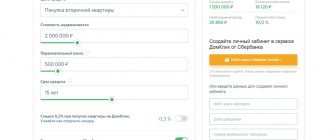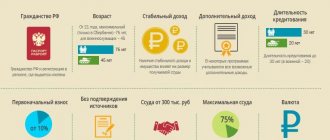Basic requirements of banks for mortgages
When deciding whether to approve a mortgage loan to a particular potential borrower, banks are guided by several main criteria. These include, quite naturally, the client’s age and citizenship, his income level and credit history parameters.
Moreover, each bank has the opportunity to independently determine the value of the criteria it applies.
Age
Most banks, including the undisputed leader of the domestic financial industry, Sberbank, have set the minimum age limit for issuing mortgages at 21 years old
. This approach is explained by more serious requirements for long-term lending than, for example, for consumer lending, which is available at almost any financial institution upon reaching the age of 18. However, some banks, the largest of which is Uralsib, are still ready to issue mortgages to clients if they are over 18 years old.
As for the upper age limit established for mortgage recipients, in most cases the age that the client will reach at the time of full payment of the loan is determined. In Sberbank it is 75 years, as in a significant part of the other most famous and large banks. Sovcombank lends to borrowers if they are under 85 years old at the end of the mortgage term.
Citizenship
Almost all major domestic credit organizations issue mortgages exclusively for Russian citizens. This number includes Sberbank, Gazprombank, Rosselkhozbank, etc. However, in recent years, some financial institutions, taking into account the rather serious demand that has emerged, have begun to lend to foreign citizens legally residing and working in Russia. This applies, first of all, to banks with foreign participation, including Rosbank, Raiffeisenbank, as well as a number of serious Russian banks, for example, VTB, Otkritie and Transcapitalbank.
In such a situation, the mandatory requirements for the borrower include official registration and a work permit in the Russian Federation.
Registration
Several years ago, a requirement related to the presence of permanent registration at the location of the bank
applying for a mortgage loan was mandatory. Today, for some banks, including Sberbank, Rosselkhozbank, Uralsib and many others, a temporary registration of the borrower is enough to approve a mortgage transaction. Moreover, some credit organizations, for example, VTB, have completely excluded registration from the requirements for a client when applying for a mortgage. In this case, the only condition for issuing a loan related to geographic location is work in Russia.
Experience
Availability of employment is almost always a mandatory requirement for a potential borrower when applying for a mortgage loan. However, the specific length of work experience in the last place is established by each bank independently. Typically, the client is required to have at least six months of employment.
However, in some cases this requirement is not critical, since even if you work for a month, it is quite possible to get a loan. This option is possible, for example, at DeltaCredit Bank. But at the same time, the borrower is offered less favorable mortgage terms, which may include:
- At an increased interest rate;
- In reducing the maximum loan period;
- The need to provide a surety or additional collateral.
Solvency
A key criterion that directly affects both the possibility of lending and the conditions offered by the bank. The client’s level of solvency depends on several factors, including:
- Total income taking into account all sources available to the client;
- The number of family members, which determines the amount of fixed expenses;
- Availability of existing credit and other types of financial obligations.
Based on the level of solvency, such an important loan parameter as the amount of the regular monthly payment is determined. Next, taking into account the resulting amount, the maximum mortgage amount and the duration of the loan agreement are calculated.
Thus, it is the solvency of the potential client that largely influences all loan parameters.
Down payment
The minimum down payment for the purchase of an apartment or other type of real estate with a mortgage is 10%. However, in some cases it is set at a higher level. For example, when purchasing a finished apartment with a mortgage through Sberbank, the first payment must be at least 15%
, and in the case of purchasing a country house, it increases further and equals at least 25% of the cost of housing.
Conditions similar to those offered by Sberbank have been established in other credit institutions. The specified amount of the down payment depends, first of all, on the liquidity of the real estate being mortgaged. That is why when buying an apartment it is usually noticeably lower than when purchasing a private house.
Credit history
The presence of a problem-free credit history, along with the client’s solvency, is in modern conditions the most significant criterion for the approval of a mortgage transaction. Moreover, current delays in financial obligations already taken by the borrower mean an almost 100% probability of refusal to issue a loan. This policy of banks is explained quite simply.
Over the past few years, real incomes have been steadily declining, which has led to serious financial problems for a large number of borrowers. It is obvious that difficulties in repaying previously taken loans can most likely lead to similar problems with a mortgage. That is why it is extremely problematic for clients with a damaged credit history and, especially, current arrears, to count on mortgage loan approval.
Other requirements
In addition to the mandatory requirements listed above, some banks establish additional conditions, the fulfillment of which is also necessary to obtain a mortgage. These usually include:
- Providing additional collateral, in addition to the purchased apartment, in the form of any property. In this case, the client is provided with a reduced interest rate and more favorable lending conditions;
- Conclusion of a guarantee agreement. Another factor that positively influences the possible parameters of a mortgage;
- Opening an account with a bank that issues a loan. A standard practice for many financial institutions that seek to earn money not only by receiving interest on a loan, but also by providing clients with other types of banking services.
Requirements for mortgage borrowers
It is necessary to distinguish between the concepts of “mortgage” and “mortgage loan”. In the first case, this refers to the form of collateral. In the second, it means a loan issued by a bank secured by real estate (already owned or purchased). This scheme is a guarantee for the lender of the return of his money.
Mortgage loans are issued only to reliable borrowers with verified income. To be sure of the client’s solvency, banks evaluate him according to a number of criteria.
Citizenship and registration
The first requirement of most banks for mortgage borrowers is Russian citizenship. Mortgages for foreign citizens are also possible. But it is available only to foreigners legally residing in Russia and working for at least six months. These facts must be documented.
Basically, mortgage offers for foreigners are available in credit institutions with foreign capital participation (Raiffeisenbank, UniCredit Bank). Among the large Russian banks, VTB offers mortgage loans for foreign citizens.
The presence of permanent or temporary registration in the region where the bank branch is located remains a mandatory requirement in some banks. However, their number is now much lower than a few years ago. Today there are credit organizations that issue mortgages even to citizens without permanent registration (for example, VTB).
Seniority
Most banks (Sberbank, UniCredit Bank, Raiffeisenbank) are ready to issue a loan if the borrower’s total work experience exceeds 1 year. Moreover, as a rule, it is enough to work at your current place of work for 3-6 months after completing the probationary period. But there are also exceptions. A number of banks are ready to consider a candidate who has worked in their last position for only 1 month.
Age
Despite the fact that full legal capacity begins at the age of 18, banks are not ready to provide mortgages to such young borrowers. The standard age requirement is 21 years. The maximum age is usually set taking into account the loan period. At the time of full repayment of the loan under the agreement, the borrower must be no more than 65 years old in Raiffeisenbank and AHML, 70 years old in Alfa Bank, 75 years old in Sberbank.
Down payment
To apply for a mortgage loan, the borrower must have his own funds to make a down payment. Its size, as a rule, starts from 10% (5% when attracting maternity capital) of the cost of the purchased property. For the lender, this is one of the factors confirming the borrower’s solvency.
Mortgages without a down payment can be given to borrowers as part of special offers at individual banks if appropriate programs are available (for example, if it is possible to register a mortgage on existing housing as a down payment). But the percentage of such proposals is not large.
Income level
The Raiffeisenbank website indicates a minimum income of 20 thousand rubles for Moscow, Moscow Region, St. Petersburg, Leningrad Region, Magadan, Yekaterinburg, Surgut and Tyumen. For borrowers from other regions, an income of 15 thousand rubles will be enough. Many banks do not publicly publish information about the minimum income level. However, it is obvious that the lower it is, the lower the approved amount will be. If the borrower's income does not allow him to obtain the required amount, he can attract co-borrowers.
On the official websites of most banks there is a calculator for calculating mortgages based on income level. It allows you to evaluate yourself as a borrower based on the criterion of solvency. The optimal ratio is when the monthly mortgage payment does not exceed half of the family's monthly budget.
Credit history
First of all, banks look at the presence of arrears on previous loans. Another important indicator is the current debt load. If payments on current loans constitute a significant share of the borrower’s income, he most likely will not be able to get a mortgage. In addition, too frequent use of small consumer loans may indicate insufficient “financial solvency.” But having a history of already repaid mortgages or car loans is a very big plus.
Document requirements
When applying for a mortgage, a potential borrower is required to provide a package of documents, the first part of which relates directly to the client:
- Bank client questionnaire;
- Passport and other personal documents, the list of which is established by the bank, including TIN, SNILS, military ID, etc.;
- Certificate of income, as well as a copy of the work record book and the current contract;
- Documents on marital status;
- Documents confirming the ability to make a down payment, for example, a certificate of capital or a bank account statement.
The second part of the documents relates to the property being purchased with a mortgage and includes:
- A report on the assessment of an apartment, house or other type of real estate, indicating information about the expert who compiled it;
- Passport or other identification document of the seller;
- Certificate of ownership of the seller for the property or an extract from the Unified State Register of Real Estate;
- Technical and cadastral passports for an apartment or house;
- Consent of the second spouse, if he/she does not act as a co-borrower on the loan;
- Insurance policy for the purchased property (issued after preliminary approval of the transaction by the bank).
Required documents
The mortgage will be issued in two stages, at each of which you need to provide a certain package of documents. At the first stage, the borrower's candidacy is approved. The bank examines the client’s documents, credit history and solvency.
To do this you need to provide:
- completed application form;
- passport - original and photocopy;
- TIN and SNILS;
- military ID, if the borrower is liable for military service;
- work book or employment contract;
- certificates confirming the client’s marital status;
- down payment information.
At the second stage, the bank examines all the data on the purchased property.
Here the client will need to provide:
- housing assessment from an independent specialist;
- seller's passport;
- documents that confirm ownership of housing;
- extract from the Unified State Register;
- all real estate passports;
- permission from a spouse to pledge property;
- insurance certificate for real estate after the conclusion of the transaction.
All these documents must be provided as soon as possible so that the bank does not suspect the client of unreliability and terminate the loan agreement. Therefore, you should prepare all the certificates in advance.
Who doesn't get a mortgage?
There are two main obstacles to getting a mortgage. The first of them is associated with the absence or insufficient level of official income. Freelancers, workers who receive wages under gray schemes, as well as entrepreneurs and the self-employed often find themselves in a similar situation.
The second problem is having a bad credit history. This situation is quite common today.
It can be further complicated by the presence of previously taken out and yet unpaid loans.
Is there an alternative?
An alternative to mortgage lending may be to obtain a consumer loan. The requirements for this category of clients are much less serious, although the interest rate is usually higher.
Another viable option for receiving funds is to contact an MFO
. However, in this case we are talking about small amounts and a short loan period. Obviously, purchasing an apartment in such a situation is unrealistic.









